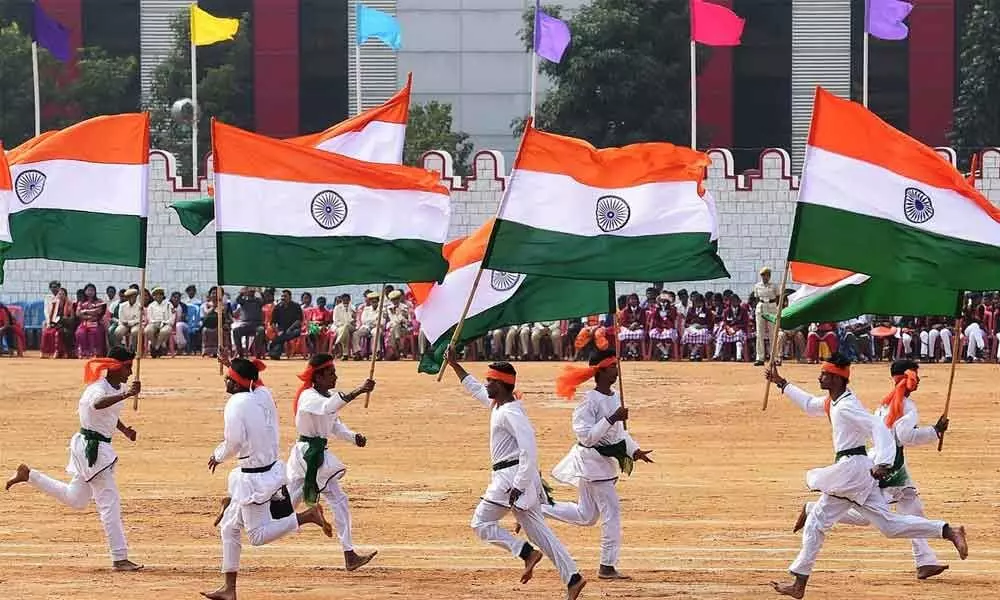Being fearless in the Republic

Being fearless in the Republic
While inaugurating the country wide coronavirus vaccination drive on January 16, Prime Minister Narendra Modi quoted the 19th century Telugu social reformer Gurajada Apparao's famous lines that, 'the notion of a nation doesn't mean mud and soil but people and their lives'. It is this very idea of people and their expectations that form the crux of philosophy behind the essence of republic.
Originally connoting 'people's thing', the word 'republic' entails the realisation of people's authority, sovereignty, freedom, liberty, fraternity, equality etc which determine the extent of a nation's glory. It is essentially these lofty ideals on which the Republic of India was founded and it came into force on 26th January 1950. It is also an awe-inspiring fact to cherish that the world's first republic also originated in India itself when the people of Licchavi state established themselves as 'Gana Sangha' around 6th century BC.
In a way, the most vital feature which is embedded in all the sacred tenets of the republic is nothing else than 'fearlessness'. Because it enables every citizen to enjoy unequivocally the rights enjoined on him/her. It was amply illustrated in Rabindranath Tagore's poem, 'Where the mind is without fear', that the spirit of fearlessness stands out as an all- time guiding principle in the unflinching pursuit of the goals of the Constitution.
Hence, the ideal of fearlessness presupposes that every citizen has, inter alia, a two-in-one fundamental human right known as freedom-cum-liberty. Freedom from fear of others, things, situations etc and liberty to be fearless of dealing with others, things, situations etc are like two sides of the same coin that holds the key to the principles of natural justice, comprising the domains of life, fraternity, equality, dignity and so on.
Living freely without fear is the sine qua non of meaningful human existence called life. A fearless quest for opportunities and making of choices will determine the quality of equality attained. Justice is what the citizen experiences when the laws and rules are freely, fairly and fearlessly applied. Fraternity signifies a fearless camaraderie which as a special feature was incorporated in the Preamble by Dr. Ambedkar. Dignity is the fearless feeling of self-worth as a result of which citizens hold their heads high.
It is at the same time to note that the realities the people face in some republics are not pleasant though they are not uncommon. Recent example is America, again a republic where its outgoing President put himself in the eye of the storm when ripples of fear spread out of racial prejudice across the nation following the killing of a black man named George Floyd in last July.
There are certain namesake republics like China and North Korea where the law of the land is autocratic and the rule is oppressive by fearsome means. Such instances of tyrannical regimes will not go down as the embodiment of a true republic in the annals of human history. Because what actually matters is the state of well-being in which the citizens eventually find themselves.
As the famed progressive poet of 20th century, Sri Sri remarked, history shall not become a sycophantic documentation of rulers' tenures but it must reflect as the mirror of real lives of real people. It implies that the fearless way of living responsibly expands not just into society and polity alone but also into the realms of economy. Pertinent here is to mention that the American politician Marco Rubio has gone on record saying aptly '... economy has to be measured in the real eyes of real people but not simply in statistics that appear in newspapers...'
Coming to the contemporary trends in the wake of Covid pandemic, the tense socio-economic conditions have already sown the seeds of fear - fear of interpersonal interactions in financial affairs, fear of taking initiatives in business enterprises, fear of holding trade meets, fear of undertaking travel and tourism etc. These repercussions are highly concerning as the same are corroborated by strict health protocols being practised in many western countries particularly after the surge of new strains of coronavirus.
The government authorities in India have elaborately embarked on various mitigating mechanisms in order to normalise lives and livelihoods. But still, the Damocles' sword of uncertainty looms large in the society. Impractical laws, unrealistic regulations, unwarranted procedures, time consuming formalities etc will only exasperate the fear-stricken financial scenario.
Therefore, a deeper analysis is required to understand the fear problems particularly in the latest economic setting. As socio-political ramifications are involved, a multi-pronged methodology needs to be taken into consideration. Both the bureaucratic agencies and the taxpayers ought to be sensitised towards each other for better cooperation and the former must take initiative because the criterion for facilitating a fearless economic environment largely depends upon their confidence-building approach towards the latter.
Politics and economy should work hand in hand in a straightforward manner since the positive synergy between the two is crucial for tackling the rampant crises like poverty, deplorable health infrastructure, joblessness, migration issues, homelessness etc. Destructive tendencies of social divide which off and on erupt on sectarian, religious, casteist, linguistic and regional grounds must be nipped in the bud with a view to boosting the spirit of fearlessness in fraternal relations and economic activities.
Renowned fearist philosophers Robert Michael Fisher and Desh Subba emphasise that every individual needs not only to be conscious of fear factor in day-to-day life but also to be optimistic about resolving the trying situations with audacity. It is here in this connection that the role of government becomes all the more crucial in facilitating a fearless socio-economic and political atmosphere so that the citizens could thrive well. Then only the people can certainly realise and live up to the aspirations of visionary forefathers who laid the foundations of a fearless and modern Republic of India. Long live, the Republic!
(The author is retired DG (Cyber Crimes), MP)








